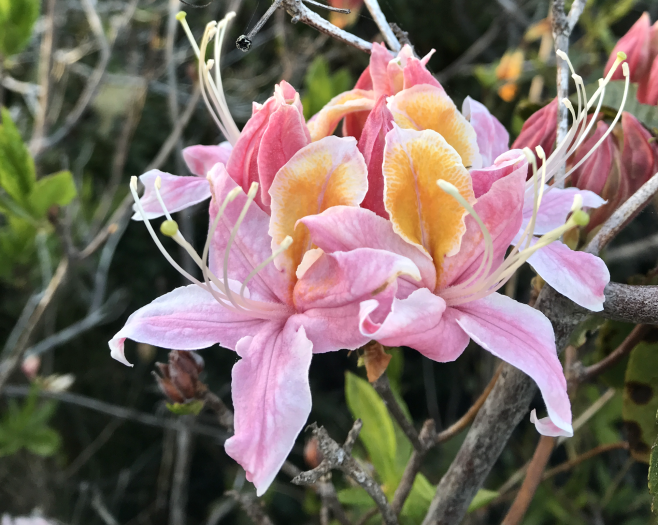Western Azalea
(Rhododendron occidentale)
Western Azalea (Rhododendron occidentale)
/
/

Karen and Mike
CC BY 4.0
Image By:
Karen and Mike
Recorded By:
Copyright:
CC BY 4.0
Copyright Notice:
Photo by: Karen and Mike | License Type: CC BY 4.0 | License URL: http://creativecommons.org/licenses/by/4.0/ | Rights Holder: Karen and Mike | Publisher: iNaturalist | Date Created: 2019-05-04T02:24Z |
















































Estimated Native Range
Summary
Rhododendron occidentale, commonly known as Western Azalea, is a deciduous shrub native to moist streambanks, wet meadows, and boggy areas in the coastal and montane regions of California and Oregon. It typically grows up to 5 meters tall and features a bushy habit with numerous branches. The flowers, which bloom from late spring to early summer, are showy and fragrant, measuring 3.5–5 cm in diameter with five distinct lobes on the corolla. The flower color varies from white to pink, often adorned with a prominent yellow blotch. This species exhibits considerable diversity, especially in the coastal regions near the Oregon-California border, where genetic variation peaks.
Western Azalea is valued for its striking, sweet-scented flowers and its adaptability to serpentine soils, which are typically challenging for many other plants. It is often used in woodland gardens, naturalized areas, and as a feature plant in moist garden settings. While it thrives in full sun or part shade, it requires high moisture levels and well-drained soils to flourish. In cultivation, it is important to mimic its native wetland conditions, avoiding waterlogged soils to prevent root rot. Despite its beauty, it can be susceptible to various pests and diseases, including lace bugs and root rot. Gardeners should be aware that it may require extra care to prevent these issues.CC BY-SA 4.0
Western Azalea is valued for its striking, sweet-scented flowers and its adaptability to serpentine soils, which are typically challenging for many other plants. It is often used in woodland gardens, naturalized areas, and as a feature plant in moist garden settings. While it thrives in full sun or part shade, it requires high moisture levels and well-drained soils to flourish. In cultivation, it is important to mimic its native wetland conditions, avoiding waterlogged soils to prevent root rot. Despite its beauty, it can be susceptible to various pests and diseases, including lace bugs and root rot. Gardeners should be aware that it may require extra care to prevent these issues.CC BY-SA 4.0
Plant Description
- Plant Type: Shrub
- Height: 5-10 feet
- Width: 3-5 feet
- Growth Rate: Moderate
- Flower Color: Pink, White, Orange
- Flowering Season: Spring
- Leaf Retention: Deciduous
Growth Requirements
- Sun: Full Sun, Part Shade
- Water: High
- Drainage: Fast, Medium
Common Uses
Bee Garden, Bird Garden, Butterfly Garden, Deer Resistant, Erosion Control, Fragrant, Hummingbird Garden, Rabbit Resistant, Showy Flowers
Natural Habitat
Moist streambanks, wet meadows, and boggy areas in the coastal and montane regions of California and Oregon
Other Names
Common Names: California Azalea, Sonoma Azalea, White-Laurel, Sommarazalea
Scientific Names: , Rhododendron occidentale, Azalea occidentalis, Rhododendron occidentale var. occidentale,
GBIF Accepted Name: Rhododendron occidentale (Torr. & A.Gray) A.Gray